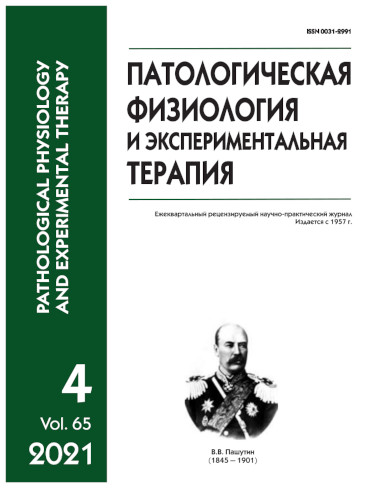Effect of different concentrations of lithium chloride on p-GSK-3β content in a model of ischemic stroke
Abstract
Background. Ischemic stroke is becoming a major medical concern worldwide. Reasons for this include the aging population, which experiences an increasing frequency of cardiovascular problems. Additionally, social factors, e.g., smoking, fatigue, substance abuse, lead to strokes in young and middle-aged people. The lack of effective medical methods for correcting acute cerebral circulatory disorders underscores the need for new drugs whose neuroprotective potential can prevent or significantly minimize the consequences and severity of ischemic stroke. Aim. To evaluate the effect of different doses of lithium chloride on GSK-3ß phosphorylation and on animal survival in a model of ischemic stroke. Methods. 29 male rats were divided into five groups: Sham-operated (n=9); control, ischemic stroke with administration of a volume of 0.9% NaCl solution equivalent to the volume of the administered drugs in other groups (n=5); and groups with administration of lithium chloride at doses of 4.2 mg/kg (n=5), 21 mg/kg (n=5), and 63 mg/kg (n=5). Ischemic stroke was produced by the Long method. After 7 days, the animals were subjected to humane euthanasia. The brain was excised, and the phosphorylated form of GSK-3β (p-GSK-3β) was measured by Western blotting. The neuroprotective effect of lithium salts occurs due to a direct inhibition of the key kinase of the apoptotic mechanism of cell signaling, glycogen-synthase kinase (GSK-3β), that is transformed into a phosphorylated form. Also, the group mortality rates were analyzed on day 7. For multiple comparisons, a critical level of significance was calculated using the Bonferroni correction. Results. Lithium chloride, 4.2 mg/kg, had a minimal effect on both p-GSK-3ß (p=0.8) and mortality compared to the control group (p>0.017). A dose of 21 mg/kg significantly increased p-GSK-3ß (p=0.008), but did not reduce mortality (p>0.017), relative to the control group. At a dose of 63 mg/kg, p-GSK-3ß was similar to that of the sham operated animals (p=0.007), and the mortality on day 7 was significantly lower (p>0.017). Conclusion. Lithium chloride produces a dose-dependent, neuroprotective effect. This protective effect occurs due to a direct inhibition of the key kinase of the apoptotic mechanism of cell signaling, glycogen-synthase kinase (GSK-3β), that is transformed into a phosphorylated form. This neuroprotection is potentially able to improve the prognosis of ischemic stroke.






